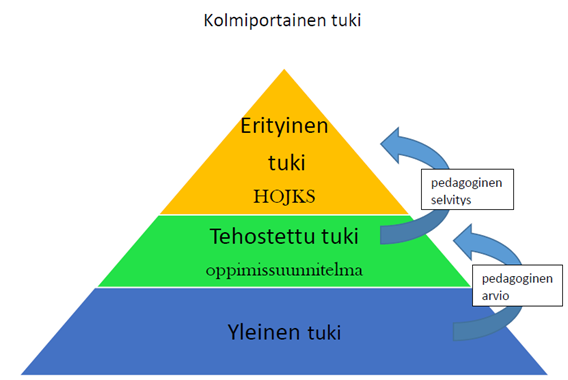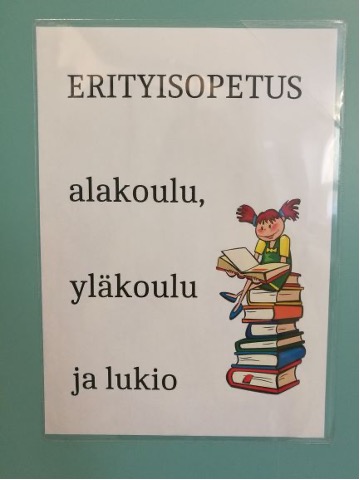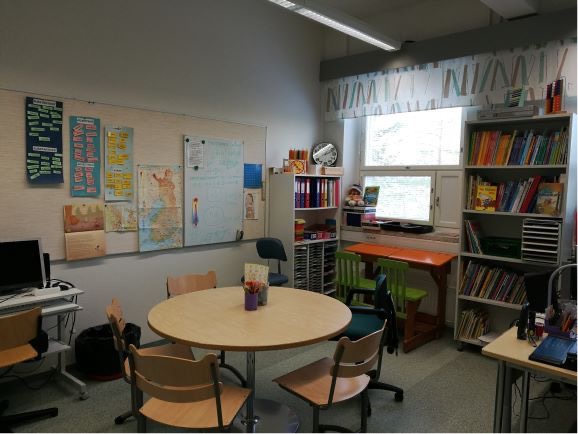Support for learning
Forms of support for learning and school attendance
Pupils have the right to receive support for their learning and schooling as soon as the need arises. Support for learning and school attendance takes the form of a ‘ three-tier system‘. Pupils can receive general, enhanced or special support to meet their learning challenges. The different levels of support include supportive teaching by the teacher, differentiated teaching in lessons, different pedagogical solutions and adapting the learning environment to promote learning and accommodate different types of learners.

Support education
Students who are temporarily behind in their studies or who otherwise need short-term support in their learning are entitled to receive remedial teaching. The support should start as soon as the learning difficulty is identified, so that the pupil does not fall behind permanently. Support is provided at all levels of support and is organised in such a way that every pupil has access to it.
The initiative to provide remedial teaching is primarily taken by the teacher, but the pupil or guardian can also take the initiative.
Part-time special education

Part-time special education is one form of support for pupils’ schooling and learning. Special needs education is usually provided in the form of concurrent teaching, either with the special needs teacher as a second teacher in a lesson or in a small group in a separate small group class, and is integrated with the other teaching the pupil receives. Special teachers work closely with class teachers, subject teachers and guidance counsellors to plan support for the pupil. Pupils can receive part-time special education at all levels of support, but the emphasis is on special education as the levels of support progress. Part-time special education may be provided for a shorter period or on a regular and planned basis, depending on the level of support and need.
Cooperation with parents and guardians in assessing and planning support for the pupil is very important.

Specialist teachers with a broad range of special needs:
- Elisa Annala (040 022 1477), responsible for grades 3 and 4
- Tommi Kanniainen (040 357 7859), grades 5 and 6
- Marja-Liisa Lehtinen (040 705 8404), classes 1 and 2
- Teija Varrio-Majava (040 571 0227), category 9
- Riitta Kanniainen (040 726 1083), grades 7 and 8
Small groups
At Hillatie School, students study in four small special education groups: classes A, B, C and D. These groups are for pupils who need enhanced or special support to support their learning. Some pupils have extended compulsory education. Pupils are given a learning plan or an IEP (personalised education plan), which sets out their learning and attendance objectives and the types of support they will receive.
Teaching is done by special class teachers, and each small group is also taught by a school counsellor. These groups are taught from Year 1 to Year 9. The classes are combined classes, which means that pupils of different ages are taught in the same class.
Small group teachers:
- Kati Lämsä A
- Teija Varrio-Majava B
- Niina Tikkainen C
- Jussi Halonen D
Help from a resource teacher
The school has a resource teacher whose duties include acting as a second teacher in teaching groups with significant support needs or large numbers of pupils.
Resource teachers:
- Pauliina Palojärvi (040 559 2598), primary school
- Pauliina Lahtela (040 680 5170), secondary school
Jopo-class
JOPO, or flexible basic education, is a different way to complete primary school. Learning takes place in a small group with the support of a teacher and a tutor. The work is based on a weekly plan, in which the tasks for the week are written down. Physical education and optional subjects are taught by a subject teacher, while other subjects are studied in a JOPO class. The order of work in the weekly plan can be decided by the student, but the student is also prepared to take responsibility for the progress of his/her own work, for scheduling and for attending the sessions. The work periods are longer than for other secondary school pupils and provide a good opportunity to get to know professions and different jobs.
The JOPO class follows the basic education curriculum, and students receive the same basic school leaving certificate as other students in the school. JOPO is not a punitive or special class, but part of the learning support provided by the school if the pupil is not doing as well as expected and knows that he or she can do better.
The JOPO class is not a place to be, but a place to be. The most important factor is the student’s own motivation, self-drive and willingness to show their real skills.
JOPO teacher
Anna-Kaisa Lehtinen (040 183 8502)
Stop category
A new class has started in January 2024, a stopover class, where pupils can study some subjects with support. The class is assisted by a school counsellor.
A teacher in a station class:
Antti Åker (040 573 6243)
